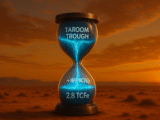
Altech Batteries Limited (ASX:ATC) long-term field data underscores reliability of sodium-nickel-chloride (SNC) technology
November 7, 2025Altech Batteries has released extensive field performance data demonstrating the notable longevity and reliability of sodium-nickel-chloride (SNC) battery technology, particularly in industrial and telecommunication environments in South Africa.
The data, drawn from more than a decade of service, offers a rare long-view performance benchmark in real operating conditions rather than controlled laboratory settings.
Highlights
• SNC batteries have been deployed for more than 15 years in telecom and industrial UPS applications
• Field failure rates reported at 0.6–1.5%, compared with 3–5% for lithium-ion systems
• Service lives of 15–20 years routinely achieved with minimal capacity fade
• Fully sealed ceramic architecture removes flammable electrolytes and reduces maintenance requirements
• Performance remains stable in environments above 50°C and during frequent power interruptions
The battery systems examined have been operating in conditions characterised by unstable grids, elevated temperatures and limited maintenance access.
These circumstances provide a stringent test environment, with field evidence showing SNC cells retaining operational stability and capacity well beyond the typical 10–15 year lifespan of lithium-ion systems, including units installed in the mid-2000s that remain in active service today.
The longevity stems from the solid-state ceramic electrolyte used in SNC systems, where the electrochemical reaction is contained within a fully sealed structure free of liquid electrolytes, thereby eliminating common degradation pathways such as dendrite formation, venting and thermal runaway.
Unlike lead-acid batteries, which are prone to sulfation and corrosion, or nickel-cadmium cells which can suffer from electrolyte leakage and memory effect, SNC chemistry appears to degrade more slowly under both cycling and standby operation.
In comparative terms, lithium-ion batteries are reported to show failure rates of approximately 3–5% in field deployments, while lead-acid systems may reach 8–12% and nickel-cadmium 2–4%. The SNC range of 0.6–1.5% is materially lower.
The company notes that SNC modules are designed such that individual cell degradation does not cause system-level failure, as multiple cells work collectively to maintain performance continuity.
Altech Batteries Managing Director Iggy Tan said the results provided external confirmation of what has long been observed in the field.
“It’s great to see real service-life data confirming the reliability and consistency of SNC battery technology. These results back up our long-held understanding of how well the batteries perform under harsh conditions, including high temperatures and frequent power disruptions.”
The data has implications for energy storage selection in industrial, remote and safety-critical environments.
SNC units operate without active cooling systems, reducing both energy overhead and mechanical complexity.
Their sealed construction also supports suitability in regulated or hazardous settings requiring ATEX compliance, where the risk of fire or gas emission must be minimised.
While lithium-ion systems dominate the broader energy storage market due to cost and energy density advantages, the performance profile outlined positions SNC technology as a candidate for long-duration, low-maintenance and risk-sensitive applications.
As energy storage infrastructure expands into more remote and high-temperature environments, the durability and failure-rate characteristics may factor more prominently in project design considerations.
Please note the following valuable information before using this website.
Independent Research
Market Open Australia is intended to be used only for educational and informative purposes, and any information on this website should not be taken as investment advice or guidance. It is important to conduct your own research before making any investment decisions, which should be based on your own investment needs and personal circumstances. Any investment decisions based on information contained on this website should be taken in line with independent financial advice from a qualified professional or should be independently researched and verified.


